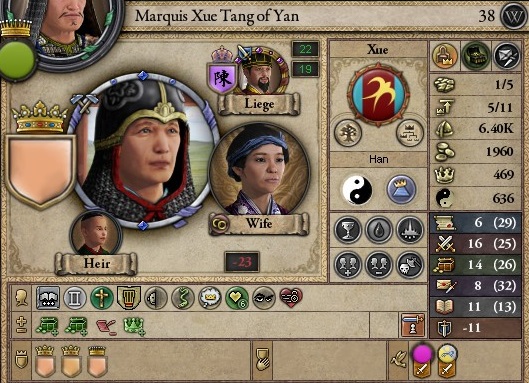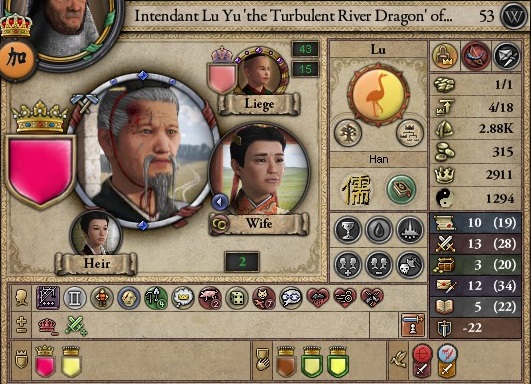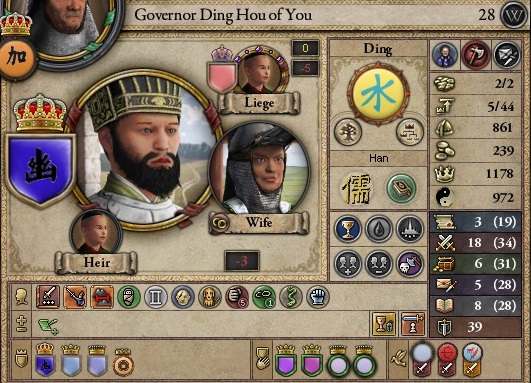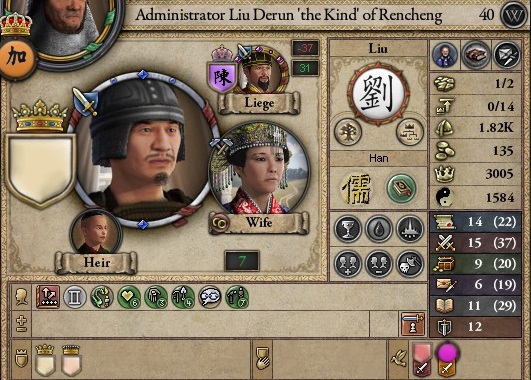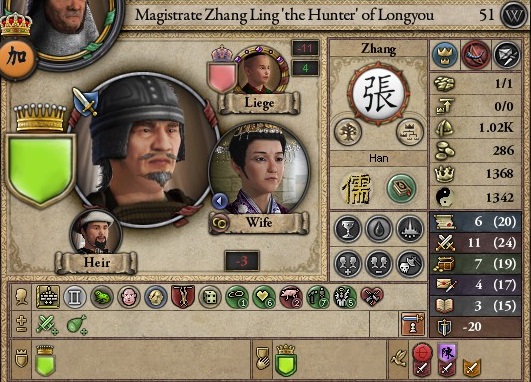233-235: Rebuilding the Dynasty
233-235: REBUILDING THE DYNASTY

Hu Zan had passed away, but his last gift to the Chen was tremendous. His victory against Xibaxiong had led to a peace with the Xianbei Confederacy, one that would finally hold long enough for the Dynasty to recover. Still, his presence was greatly missed at court, with the Emperor mourning the loss of his mentor. Hu Zan had actively routed for the military career a young Xiao Tung when his own father didn’t believe in him. Now that he was Emperor Wu, he felt like he owed a lot to the late general, which is why he was honored as a hero in the Capital. With an imperial decree, Emperor Wu posthumously made Hu Zan the General who Guards the Dynasty. He also considered promoting him from marquis to duke, but this idea was abandoned at the insistence of Xiao Bin. While the Chancellor was all too happy to exploit the legacy of his personal enemy now that he was dead, he worried that this would be used as an excuse to strengthen the Hu Clan.


And the Hu Clan was certainly vocal about continuing Hu Zan’s legacy. His third son and heir Hu Jingxuan, the new Marquis of Donghai, petitioned the court to be appointed as the new Grand Commandant. After all, he had passed court exams and was known to be both brave and courageous. He was liked enough at court that the idea was entertained, if only out of consideration for his father. For his part, Hu Zan had hinted on a few occasions that he wanted his protégé Xue Tang to be his political heir, with some arguing that he should be promoted to replace his mentor. And then there was still Ba Daiping alive and well. He was the last of the old guard, the commanders who had made their careers in the late Han. Out of the three generals who had successfully pushed back the Liang invasion, he was the only one who remained. Adding to that his previous experience as Grand Commandant and his known desire to recover the officer, and it was easy to see why many considered him the obvious choice.



But these three candidates would see their chances dashed by the Chancellor Xiao Bin, who used his influence over his brother to remove these potential threats to his authority. His refusal of the first two was easily explainable by his deep hatred for Hu Zan. Promoting the man’s son was not something that he would allow, not in a million years. Same for Hu Zan’s protégé. He heard his brother talk about Xue Tang, and he became worried that this would become another Hu Zan, moving Emperor Wu away from court and toward dangerous ideas like empowering the military. But Ba Daiping had been a rival of Hu Zan and had no ties to the late general. He was probably the best man for the job. But Xiao Bin also remembered that Ba Daiping had led an uprising against the Chen Dynasty. This might have been tolerated in time of war, but now that peace had returned to the Chen he was not going to accept the rise of a chief traitor.

In the end, Emperor Wu settled on a compromise candidate that was satisfying for everyone. The new Grand Commandant would be Xue Fang, the elderly father of Xue Tang. Xue Fang had proven over the recent campaign to be an excellent commander and a wise man at that. He was loyal to the Dynasty and lacked the political affiliation at court, even as his son had been Hu Zan’s protégé. The old man was a respected general, related to an ally of Hu Zan, but also neutral when it came to the current politics of the Chen court. Having been wounded during the last battle with the Xianbei invaders, Xue Fang would also need to lead from the rear, thus leaving the glory and direct command to others, which suited the generals just fine. Emperor Wu promoted Xue Fang to Grand Commandant and also decided to make him the Marquis of Yan to reward his long military career in the Han and the Chen.

Surprising everyone, Xue Fang first action as Grand Commandant was to advise for a new campaign. But not against the Xianbei Confederacy, as they desperately needed that peace to hold out as long as possible. Instead, the Grand Commandant petitioned that the Chen Dynasty use the current civil war in the Liang to expand by attacking the rebellious general Zhao Yun, who was trying to overthrow Emperor Wen of Liang. Many argued that the Dynasty needed to recuperate, and others pointed out how Prince Xiao Dang was married to Zhao Yun’s daughter. But Emperor Wu and the generals could see that this was a golden opportunity. The Emperor cautiously ordered some plans to be drawn out for a potential campaign. But this would be for nothing, as Zhao Yun died in January 234, with his son quickly working out a peace with the Liang court.

And besides, the man who had suggested the campaign in the first place was dead by that point. Xue Fang had passed away on the 1st of January 234, dying from the wound he had suffered against the Xianbeis. His death relaunched the debate of who would be the next Grand Commandant. While an old officer took over the duties for a month or two, in the end Emperor Wu decided to trust his late mentor’s judgement and appointed Xue Tang to the office. Hu Zan’s protégé had already been allowed to inherit the title of his father and was now the Marquis of Yan. He was ambitious and wanted to finish what Hu Zan had started, though he lacked the political skills or the charisma to be on the same level as his mentor. It didn’t stop Xiao Bin from criticizing the appointment however, as he had hoped that the death of Hu Zan would finally mean the end of his influence over the Emperor. Apparently, the great general still held some sway even after his passing.


Not wanting to get all the attention on his first day, Xue Tang did not do the same as his father, instead agreeing with the court that the Chen Dynasty needed time to rebuild. The Chen Dynasty had spent the last half a decade fighting revolts from the inside and invaders from the outside. It was time to rebuild, to ensure that things didn’t fall apart the second another invasion came their way. The generals went to their commanderies or were sent on the border to fortify while Xiao Bin and the rest of the council worked on a policy to rebuild the Chen. With Hu Zan gone, the Chancellor was given a lot more opportunities to put his mark on the decisions, and Emperor Wu was all too happy to listen to his brother’s advice. The only issues on which they clashed was the military (which Emperor Wu favored far too much for Xiao Bin’s tastes) and the legal reforms of their father (Emperor Wu found them too ruthless while Xiao Bin supported them).
But the efforts to rebuild the Chen would not come fast enough. Sick of the instabilities that had gripped the Chen over the years, a group of peasants revolted in March in a county close to the Imperial Capital of Chenguo and decided to try and break free from the Chen. The peasant leader selfishly wondered why his family hadn’t been compensated for the many wars that had happened, even though his farm had been destroyed by one of the earliest revolts and had been rebuilt since. The problem was that he had managed to assemble around four thousand troops and were prepared to march on Chenguo.

The idea of seeing a peasant army sacking the Imperial Capital was not a happy one, which prompted Emperor Wu to take personal command of the response. While he took command of the army, he still wanted his wife and allies to be safe. He went so far as to temporarily recall the Crown Prince Xiao Gong to the Capital so that he could help oversee the defenses. This would give him some good experience and would be an excellent test of character. And it would also give Changle a chance to see him again. She had not seen much of her sons now that most of them served in provincial posts away from court (Xiao Dang had been appointed Administrator of Donglai Commandery following the death of the insane Yi Shing). Xiao Gong thus returned to Chenguo where the dull prince received a warm welcome from his relatives.

The peasant army only approached the Imperial Capital by the end of June, at which point Emperor Wu had an army ready to face them. Sadly, none of his generals had been able to link up with him to join this battle in front of Chenguo. Only one man managed to race in time to join the fray with troops, his surprise appearance allowing him to launch a daring assault on the rebel flanks. This was none other than Prince Xiao Dang, coming to his brother’s rescue in his hour of need. This was surprising, especially considering how Xiao Dang had previously joined a rebellion against his brother. Thanks to this unexpected arrival, the forces of the Emperor were able to easily dispatch these rebels and end the revolt in one swoop. Emperor Wu, unwilling to punish the people further, made sure to limit taxes in the rebellious region for the following year (though Xiao Bin and the Excellency of Works would make sure to compensate for it in the ensuing years).

Following this victory, Xiao Dang and Emperor Wu had their first face to face discussion since the brothers found themselves on opposing sides of a civil war. While the Emperor still felt slighted and betrayed by his brother, he decided that this show of dedication earned Xiao Dang a second chance. His brother would be allowed to prove that he was loyal, that he could serve the Chen Dynasty. All Xiao Dang had ever wanted was to regain his position as Excellency of Works, which he had held at the dawn of Emperor Cheng’s reign. And after decades of trying, he finally achieved his goal by showing dedication to his brother. With Xiao Bin also backing the idea of bringing their brother in (as Xiao Dang was known to be an excellent administrator), the fourth son of Emperor Cheng was made Excellency of Works in July 234.

One person was vehemently against the appointment however, and that was Crown Princess Ding. She argued that her husband deserved the promotion as a reward for his defense of the Capital. He was the Crown Prince, and she was the Crown Princess! Their place was in Chenguo, not in some provincial post away from the Capital! She had only just settled in the Crown Prince’s palace! Her insistence made Xiao Bin suspicious of the ambitious crown princess, who obviously sought more power for herself through her husband. Thankfully, Crown Prince Gong had proven quite unimpressive outside of his military duties, and Emperor Wu needed no convincing when it came to sending his son back to his county to gain more experience. Even Changle agreed with the decision, though in her case it was due to her disdain for her daughter-in-law’s openly anti-barbarian rhetoric. If Crown Princess Ding wanted access to the Inner Court, then she made no effort to gain any friends in it.

The appointment of Xiao Dang as Excellency of Works would prove a boon for the Dynasty. He was proving to arguably be the best holder of the office since the founding of the Chen. He was hardworking and stubborn when it came to completing his projects, always seeking ways to make them work even when some argued that they should be abandoned. He was also quite fair and just in his handling of his subordinates, a sense of fairness that did not turn to cruel justice like it did with their father. With Xiao Bin already proving an amazing Chancellor, Emperor Wu found himself backed by two excellent brothers. The popular monarch was himself growing more competent when it came to his administrative duties. Plus, he was already an amazing commander in his own rights, thus earning him the loyalty of the military. This state of affairs would be the status quo of Emperor Wu’s policy when it came to handling the various factions. His family stayed at court, and his generals stayed on the field. Never was one side to gain power in the other, thus avoiding that one group gained too much power or influence as to threaten the Emperor. It was a balance that Emperor Wu would prove able to keep.
Toward the end of the year, the Chen Dynasty was presented with an unexpected opportunity for expansion. The Liang Dynasty was in the middle of another civil war, though it was clear that Emperor Wen would be the one to come out on top. The rebel Huo Du, who was bordering the territories of the Chen Dynasty, decided to ensure his survival by offering his loyalty to another emperor. Emperor Wu was quite pleased when envoys arrived to Chenguo requesting that Huo Du be allowed to join the Chen Dynasty, the true heir to the Han. While Xiao Bin had some fears that this might lead to open conflict with the Liang, the three brothers agreed that they could not miss this opportunity. Emperor Wu gladly accepted this submission, sending his general Liu Derun with a contingent of Chen troops to reinforce Yangling Commandery.

Thankfully, the Liang Dynasty did not do anything about this annexation, leaving the Chen to acquire these new territories without any troubles. But there was still one issue that did flare up: Huo Du’s titles. Under the Liang Dynasty, Huo Du had been given the title of Marquis of Yangling, which he still claimed for himself. But the fact was that this was a title given by the Liang emperor. As the official policy of the Chen Dynasty was that the Liang emperors were illegitimate usurpers, this title could not be recognized by the court in Chenguo. Even as Huo Du insisted that he was still a marquis, even as the court called him “Administrator of Yangling Commandery” in the official letters. Xiao Bin eventually offered a solution to this, with Huo Du being received in Chenguo and promoted to the title of Marquis of Yangling by Emperor Wu. This way Huo Du would be able to be a marquis again, except that this time the title would come from the Chen, not the Liang. This left the new subordinate dissatisfied, as he felt he was given something he already owned, but no more issue came from it.

By the end of December, the rebuilding of the Chen was proving so effective that Emperor Wu was considering military expansion, going as far as asking his Grand Commandant Xue Tang for potential campaign plans. Conquest of territories was certainly out of the question at the moment. While the Liang Dynasty was internally weakened, Xue Tang did not believe the Chen Dynasty strong enough to make a move against it. As for the Xianbei, Xue Tang did not believe that breaking the peace with Xibaxiong would accomplish anything other than dooming the Chen. And in the south, most of the barbarians paid tribute to Chenguo, thus making their conquest useless. Well, not all of them. Chief Yan Baotun of Qiantang refused to accept Chen authority. Clearly, this was something that needed to be fixed. The Xiao brothers sent envoys to the barbarian chieftain demanding tribute. When Yan Baotun refused them, Emperor Wu declared war on him, a decision he took on the last day of 234.

Trusting thar Xiao Bin could handle the affairs of the court in his absence, Emperor Wu took personal command of this expedition, though he would not go alone. By his sides were two generals that were quickly rising within the Chen military, a clear sign that unlike the Liang, the Chen did have a next generation of officers to rely on once the old men had all died. The first one was obviously the ever-loyal Liu Derun, whose devotion to the Chen Dynasty had been felt ever since he abandoned his titles out of loyalty to Emperor Cheng. He was kind, humble and sociable, all things that endeared him to Emperor Wu. With them was the new Marquis of Donghai Hu Jingxuan. The son of Hu Zan was finally given an opportunity to make a name for himself instead of coasting on his father’s reputation, a chance he was not going to waste.

The high morale and good spirit that surrounded this campaign were hampered when Emperor Wu received news from his youngest son Xiao Zenguang. Toward the end of 234, the third prince had followed in his brother’s footsteps by being appointed to a provincial post to gain some experience in government. Emperor Wu had high hopes for Xiao Zenguang, who was an honest and hardworking young man with a kind heart and a mind dedicated to studying. But in early 234, the prince’s longtime weakened health proved to be early symptoms of leprosy. Realizing what this meant, and fearful that this might spread to others, Xiao Zenguang would from now on isolate himself from political life. In his letter to his parents, he thanked them for their love and warned them that he would do his upmost to never meet them again.

This news was heartbreaking to the Empress, who tried against good sense to go meet her poor son, who was only 17. Emperor Wu, himself saddened at the cruel fate Heaven had placed on his youngest son, had to put guards in front of the Empress’s palace for the rest of the campaign to stop Changle from going to their son’s side. Already Xiao Dan was struck with bouts of madness, and now his youngest was a leper. In a private letter to Xiao Bin, Emperor Wu asked his brother what he had done for Heaven to turn on him like that. Their father had been a monster, and still his sons were all competent men without issues. Yet he acted rightfully, and even punished him. Wasn’t the Son of Heaven supposed to be good? However, Emperor Wu was not aware of Xiao Cang’s own mental problems, which seemed to indicate at the very least his family was prone to mental illness.


Familial tragedies could not get in the way of the campaign. Well, campaign might be a bit of a stretch. Yan Baotun decided to go on the offensive, with his troops entering the Chen Dynasty at the start of 235. He hoped to raid enough of towns and cause enough chaos that the Emperor would decide that this was not worth it. But the barbarian chieftain never had any chance. His army barely had two thousand warriors in it. When the imperial forces showed up with four times his numbers in March, he was easily defeated on the battlefield. Fearful of what this Imperial Army would do if they came to his territories, Yan Baotun immediately agreed to become a tributary of the Chen Dynasty, thus ending this whole war after a single battle four months in. The Chen Dynasty was certainly growing in power and influence, and Emperor Wu was confident that this would only continue in the years to come.

____________________________
PS: Sorry for the month long pause. I just really needed that time to study, cause I suck at learning language and I need to learn two of them for my doctorate. Anyway, I'm back for the holidays, so I should be able to post way more often.
Attachments
- 5
- 1



























































